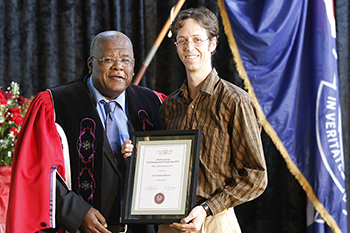Latest News Archive
Please select Category, Year, and then Month to display items
06 November 2023
|
Story MBALI MABOEA
|
Photo SUPPLIED
 The Department of Geography on the UFS Qwaqwa Campus recently played host to the Society of South African Geographers Conference (SSAG 2023), which gathered more than 100 students over three days.
The Department of Geography on the UFS Qwaqwa Campus recently played host to the Society of South African Geographers Conference (SSAG 2023), which gathered more than 100 students over three days.
Fostering academic growth, collaboration, and inspiration among students and researchers in the field of geography, the Department of Geography on the UFS Qwaqwa Campus recently played host to the Society of South African Geographers Conference (SSAG 2023), which gathered more than 100 students over three days.
Following a five-year hiatus, the three-day conference comprised student proposal presentations in different fields: human geography, environment geography, geoinformatics, and physical geography, divided into breakaway sessions over two days. Furthermore, day three of the annual conference included an excursion to the Basotho Cultural Village and Clarens.
The three-day annual student conference focused on different themes presented by two main speakers. The topic of the first keynote speaker, Dr Mahlomola Daemane, General Manager of the SANParks Arid Research Unit, focused on the contemporary conservation, transition, and relevance of science in policy and decision making.
The second keynote speaker was Dr Felicia Akinyemi, a Marie Sklodowska-Curie Research Fellow affiliated with the Institute of Geography at the University of Bern in Switzerland. Her work focuses on the intersection of geoinformatics, global change, and sustainability. Dr Akinyemi focused her talk on the integrative geospatial methods and metrics for sustainable land use. She introduced different techniques and metrics and gave students insight in early-career African research.
Speaking about the success of the conference, Nthebohiseng Sekhele, Geography Lecturer on the Qwaqwa Campus and chair of the organising committee, said, “The local organising committee was also very impressed with the quality of presentations from our postgraduate students in Geography, as well as the robust discussions that happened during the parallel sessions in the two days of the conference. We had a positive response of physical and online participation from many universities across South Africa. We are pleased that we have achieved our goal with this conference, which is to inspire the next generation of geographers.”
UFS Vice-Chancellor’s vision for 2016: R100 million before September
2016-03-03

|
At the official opening of the University of the Free State (UFS), held on 19 February 2016 on the Bloemfontein Campus, Prof Jonathan Jansen, Vice Chancellor and Rector, announced that his priority for the year is to raise R100 million. Deserving students who cannot afford to study will receive bursaries through the Student Bursary Fund Campaign.
Staff will also have the opportunity to contribute to the fund.
Prof Jansen thanked staff for their hard work in the midst of what he described as “by far the most difficult year for admissions, registration, accommodation, and student finance”. The heightened expectations of students after FeesMustFall and the limited capacity of the university to meet the desires of students took its toll on staff.
Because of the incredible strain taken by staff members, both emotionally and physically, the Vice-Chancellor gave staff the assurance that they will receive spiritual, emotional, and health support.
“Never before have I seen such dedication from all our staff to hold the university together in these trying times,” Prof Jansen said.
“Because of you, we have a record intake of first-year students into the UFS. We have had about 5 000 students on average in the past three years and, as of today, we are nearing 7000 first-years with the strong possibility that we will enroll several thousand more students, once the new South Campus registrations come on line later this year. By mid-2016, we will exceed our own target of 8 000 students,” said Prof Jansen.
He stipulated that it is not only good for the finances of the university but also for the youth of the country who can access a quality university in central South Africa where the safety of its staff and students is a priority.
Another highlight at this event was announcing Dr Christian Williams from the Department of Anthropology as the winner of the 2016 Distinguished Scholar Book Prize for his book, National liberation in postcolonial southern Africa: a historical ethnography of SWAPO’s exile camps.
Amidst the sad episodes of violence and destruction on campuses around South Africa, Prof Jansen highlighted how the UFS will – through a seven-point approach - manage the university during these difficult times:
1. Doing everything within our capacity to meet the needs of staff and students
2. Upholding the right to peaceful protest in our democracy
3. Acting swiftly against any unlawful actions by students or workers
4. Upholding the authority of the unions (only UVPERSU and NEHAWU)
5. Finding humane and just solutions to the problem of outsourcing
6. Not placing the UFS at financial risk by making irresponsible decisions
7. Maintaining an open door policy.